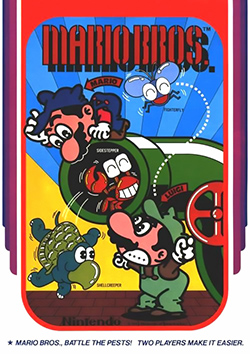
Mario Bros. is a 1983 platform game developed and published by Nintendo for arcades. It was designed by Shigeru Miyamoto and Gunpei Yokoi, Nintendo's chief engineer. Italian twin brother plumbers Mario and Luigi exterminate creatures, like turtles (Shellcreepers) and crabs emerging from the sewers by knocking them upside-down and kicking them away. The Famicom/Nintendo Entertainment System version is the first game to be developed by Intelligent Systems. It is part of the Mario franchise, but originally began as a spin-off from the Donkey Kong series.

Earthworm Jim is a 1994 run and gun platform game developed by Shiny Entertainment, featuring an earthworm named Jim, who wears a robotic suit and battles the forces of evil. The game was released for the Sega Genesis and Super Nintendo Entertainment System, before being subsequently ported to several other video game consoles.

Super Mario Bros.: The Lost Levels is a 1986 platform game developed and published by Nintendo. A sequel to Super Mario Bros. (1985), it was originally released in Japan for the Family Computer Disk System as Super Mario Bros. 2 on June 3, 1986. Nintendo of America deemed it too difficult for its North American audience and instead released an alternative sequel, also titled Super Mario Bros. 2, in 1988. It was remade and renamed The Lost Levels for the 1993 Super Nintendo Entertainment System compilation Super Mario All-Stars, serving as its first international release. It has been rereleased for Game Boy Color, Game Boy Advance, Wii, Wii U, Nintendo 3DS and Nintendo Switch.

River City Ransom, known as Street Gangs in PAL regions, is an open world beat 'em up video game originally for the Nintendo Entertainment System. It is an English localization of Downtown Nekketsu Monogatari for the Famicom. The game was developed by Technōs Japan and released in Japan on April 25, 1989.

Pokémon Snap is a 1999 first-person photography game with rail shooter style gameplay mechanics developed by HAL Laboratory and published by Nintendo for the Nintendo 64. It was first released in Japan in March 1999 and was later released in July 1999 in North America and in September 2000 for PAL regions. It is a spin-off game in the Pokémon series, being one of the first console-based games for it, and featuring many Pokémon rendered for the first time in real-time 3D. The game was re-released for the Wii's Virtual Console in December 2007, for the Wii U's Virtual Console in 2016, and for the Nintendo Switch Online + Expansion Pack in June 2022.

Resident Evil 4 is a 2005 survival horror game developed and published by Capcom for the GameCube. Players control the special agent Leon S. Kennedy on a mission to rescue the US president's daughter, Ashley Graham, who has been kidnapped by a religious cult in rural Spain. Leon fights hordes of enemies infected by a mind-controlling parasite and reunites with the spy Ada Wong. In a departure from the fixed camera angles and slower gameplay of previous Resident Evil games, Resident Evil 4 features a dynamic camera system and action-oriented gameplay.

The Legend of Zelda: Twilight Princess is a 2006 action-adventure game developed and published by Nintendo for the GameCube and Wii. Originally planned for release exclusively on the GameCube in November 2005, Twilight Princess was delayed by Nintendo to allow its developers to refine the game, add more content, and port it to the Wii. The Wii version was a launch game in North America in November 2006, and in Japan, Europe, and Australia the following month. The GameCube version was released in December 2006 as the final first-party game for the console.

Donkey Kong Jr. Math is an edutainment platform video game developed and published by Nintendo for the Nintendo Entertainment System. It is a spin-off of the 1982 arcade game Donkey Kong Jr. In the game, players control Donkey Kong Jr. as he solves math problems set up by his father Donkey Kong. It was released in Japan in 1983 for the Family Computer, and in North America and the PAL region in 1986.
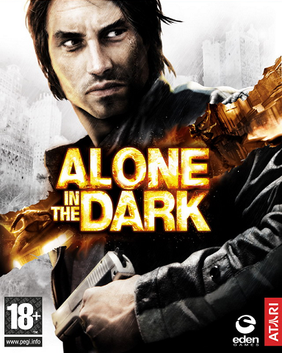
Alone in the Dark is a survival horror video game published by Atari Interactive and is the fifth installment of the series under the same name. The game was released for Microsoft Windows, PlayStation 2, Xbox 360 and Wii in Europe, North America, and Australia in June 2008. The PlayStation 3 version, titled Alone in the Dark: Inferno, was released in November 2008 and includes several enhancements from the other versions. The Windows, Xbox 360 and PlayStation 3 versions were released by Electronic Arts in Japan on December 25, 2008.

MySims is a video game developed by EA Redwood Shores and published by Electronic Arts as a spin-off to Maxis' The Sims franchise for the Wii and Nintendo DS in September 2007, re-released for Microsoft Windows and mobile phones in 2008, and for BlackBerry in 2009. The game sold 3.7 million units as of 2008.

Godzilla: Unleashed is a 3D fighting video game based on Toho's Godzilla franchise. It was developed by Pipeworks Software and published by Atari. The game was released in North America on November 20, 2007 for PlayStation 2; and on December 5 of the same year for the Wii. A Nintendo DS version, titled Godzilla Unleashed: Double Smash, was also released in North America on December 5, 2007.

Jenga World Tour is a 2007 video game based on the popular Jenga game that was developed by Atomic Planet Entertainment and published by Atari, and released for the Nintendo DS and the Wii. It uses the standard gameplay of Jenga, but gives it slight tweaks in order to create different scenarios.
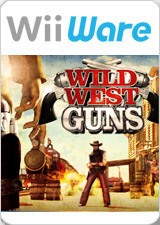
Wild West Guns is an action-adventure shooting video game developed by Gameloft Bucharest and published by Gameloft. It was released in 2011 for button-operated/keypad-based mobile phones, in August 2008 in Japan for the Wii and on February 5, 2009 worldwide for iOS devices via the Apple App Store.
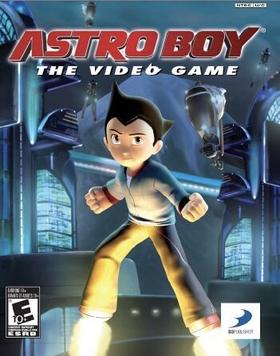
Astro Boy: The Video Game is an action platform video game based on the 2009 animated film Astro Boy. The game was released in Japan on October 8, 2009 for the PlayStation Portable under the name Atom to coincide with the Japanese theatrical release on October 10, 2009. It was later released on the same system as a downloadable game in North America on October 14, 2009. It received a retail version of it and a port to the PlayStation 2, Wii and Nintendo DS which were released on October 20, 2009 to coincide with the North American theatrical release of the film on October 23, 2009. It features the voices of Freddie Highmore and Kristen Bell, reprising their film roles.

MySims SkyHeroes is a video game developed by Behaviour Interactive and published by Electronic Arts. It is the sixth and final game in the MySims series. The game was released in 2010 for the Nintendo DS, PlayStation 3, Wii, and Xbox 360.

Cartoon Network: Punch Time Explosion is a 2011 crossover fighting video game developed by Papaya Studio and published by Crave Games, for the Nintendo 3DS. It features characters from various Cartoon Network programs battling against one another. The game was released in June 2011 in North America and in April 2012 in Europe. An upgraded port, Cartoon Network: Punch Time Explosion XL, was released for the Wii, PlayStation 3, and Xbox 360 less than a year later.

The Wand is a line of game controllers released by Nyko as third-party alternatives to the official Nintendo Wii Remote. The original Wand duplicated the functionality of the Wii Remote, while the updated Wand+ added internal replication of the Wii MotionPlus for more advanced motion sensing, similar to Nintendo's later Wii Remote Plus. The Wand series also adds additional functionality through the use of a proprietary extension of the standard Wii Remote expansion port.
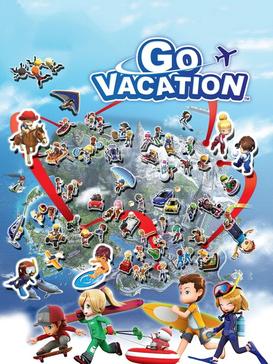
Go Vacation is a 2011 party video game developed and released by Bandai Namco Games for the Wii and Nintendo Switch. It is the third game in the We Ski series and a spin-off to the prior two main titles. Up to four players can compete against each other in over 50 sport-based minigames that take place in four fictional island resorts. Minigames range from activities such as kayaking and horseback riding, to activities like table hockey and minigolf. Different resorts can be accessed using vehicles such as trolleys and bicycles. Players can customize the outfit of their avatar and decorate their house with furniture.

Gnomz is a single-screen platform fighting video game developed and published by Polish studio QubicGames. It was released for the WiiWare on November 3, 2011 to mixed reviews from video game journalists. Critics praised its fun and chaotic gameplay, but found the amount of content too little for a ten-dollar WiiWare game. Writers also compared the gameplay to that of Super Mario War.

















